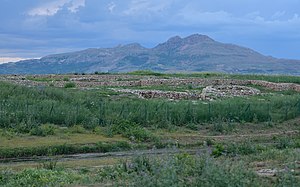Çayönü
 The site of Çayönü, in southeastern Turkey | |
 Shown within Near East | |
| Location | Diyarbakır Province, Turkey |
|---|---|
| Coordinates | 38°12′59″N 39°43′35″E / 38.21639°N 39.72639°ECoordinates: 38°12′59″N 39°43′35″E / 38.21639°N 39.72639°E |
| Type | Settlement |
| History | |
| Founded | 8,630 BC[1] |
| Abandoned | 6,800 BC[1] |
| Periods | Neolithic |
Çayönü Tepesi is a Neolithic settlement in southeastern Turkey which prospered from circa 8,630 to 6,800 BC.[1] It is located forty kilometres north-west of Diyarbakır, at the foot of the Taurus mountains. It lies near the Boğazçay, a tributary of the upper Tigris River and the Bestakot, an intermittent stream.
Archaeology[]



The site was excavated for 16 seasons between 1964 and 1991, initially by Robert John Braidwood and Halet Çambel and later by Mehmet Özdoğan and Aslı Erim Özdoğan.[2][3] The settlement covers the periods of the Pre-Pottery Neolithic A (PPNA), the Pre-Pottery Neolithic B (PPNB), and the Pottery Neolithic (PN).
The stratigraphy is divided into the following subphases according to the dominant architecture:[4]
- round, PPNA
- grill, PPNA
- channeled, Early PPNB
- cobble paved, Middle PPNB
- cell, Late PPNB
- large room, final PPNB
An analysis of blood found at the site suggested that human sacrifice occurred there.[5]
Origin of domestication[]
Animal life - domestication of pigs and cattle[]
Çayönü is possibly the place where the pig (Sus scrofa) was first domesticated.[6]
Farming - cultivation of cereals[]
Genetic studies of emmer wheat, the precursor of most current wheat species, show that the slopes of Mount Karaca (Karaca Dağ), which is located in close vicinity to Çayönü, was the location of first domestication. A different DNA approach pointed to Kartal Daği.[7]
Robert Braidwood wrote that "insofar as unit HA can be considered as representing all of the major pre-historic occupation at Cayonu, cultivated emmer along with cultivated einkorn was present from the earliest sub-phase."[8]
See also[]
- Cities of the ancient Near East
- Göbekli Tepe
Notes[]
- ^ Jump up to: a b c Collins, Andrew (2014). Gobekli Tepe: Genesis of the Gods: The Temple of the Watchers and the Discovery of Eden. Simon and Schuster. p. 93. ISBN 9781591438359.
- ^ Çambel, H.; Braidwood, R. J., eds. (1980). The Joint Istanbul-Chicago Universities' Prehistoric Research in Southeastern Anatolia. Istanbul University Publications. 2589. Istanbul. OCLC 15163668.
- ^ Özdoğan, A. (1999). "Çayönü". In Özdoğan, M.; Başgelen, N. (eds.). Neolithic in Turkey: The Cradle of Civilization, New Discoveries. Istanbul: EGE Yayınları. pp. 35–64. ISBN 975-6899-41-7.
- ^ Pearson, J; Grove, M; Ozbek, M; Hongo, H (2013). "Food and social complexity at Çayönü Tepesi, southeastern Anatolia: Stable isotope evidence of differentiation in diet according to burial practice and sex in the early Neolithic". J Anthropol Archaeol. 32 (2): 180–189. doi:10.1016/j.jaa.2013.01.002. PMC 4066944. PMID 24976671.
- ^ Loy, Thomas H.; Wood, Andrée R. (1989). "Blood Residue Analysis at Çayönü Tepesi, Turkey". Journal of Field Archaeology. 16 (4): 451–460. doi:10.1179/jfa.1989.16.4.451.
- ^ Ervynck, A.; et al. (2001). "Born Free? New Evidence for the Status of Sus scrofa at Neolithic Çayönü Tepesi (Southeastern Anatolia, Turkey)". Paléorient. 27 (2): 47–73. doi:10.3406/paleo.2001.4731. JSTOR 41496617.
- ^ Civáň, Peter; et al. (2013). "Reticulated Origin of Domesticated Emmer Wheat Supports a Dynamic Model for the Emergence of Agriculture in the Fertile Crescent". PLOS One. 8 (11): e81955. Bibcode:2013PLoSO...881955C. doi:10.1371/journal.pone.0081955. PMC 3843696. PMID 24312385.
- ^ Braidwood, Robert J.; et al. (1974). "Beginnings of Village-Farming Communities in Southeastern Turkey, 1972". Proc. Natl. Acad. Sci. USA. 71 (2): 568–572. Bibcode:1974PNAS...71..568B. doi:10.1073/pnas.71.2.568. PMC 388049. PMID 16592143.
External links[]
| Wikimedia Commons has media related to Çayönü. |
- Archaeological sites in Southeastern Anatolia
- Former populated places in Turkey
- Geography of Diyarbakır Province
- Buildings and structures in Diyarbakır Province
- Prehistoric Anatolia
- Tells (archaeology)
- Near East archaeology stubs
- Turkey stubs

